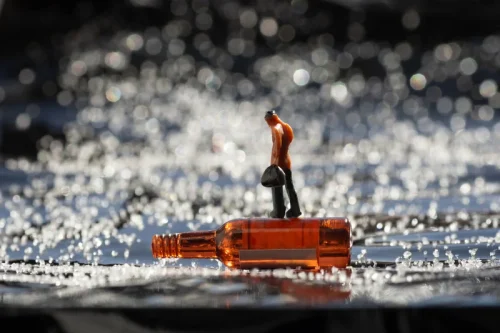Naltrexone for Alcoholism

If you’re aiming to moderate your drinking, you may be asked to keep a “drinking diary”. The therapy may be your preferred treatment option if you feel uneasy or unwilling to discuss your problems in a group setting. One of the main beliefs behind AA is that alcoholic dependence is a long-term, progressive illness and total abstinence is the only solution. Many people who have alcohol dependency problems find it useful to attend self-help groups, such as Alcoholics Anonymous (AA) or SMART Recovery. A course of naltrexone can last up to 6 months, although it may sometimes be longer.

Health Conditions
Following repeated administration of alcohol, the brain attempts to restore normal function through physiological adjustments (i.e., counteradaptations) that tend to reduce alcohol’s initial sedating effects (Roberts and Koob 1997). When a person terminates a prolonged drinking session, these counteradaptations are unopposed, resulting in signs and symptoms of acute withdrawal. During this period, craving may represent a desire to self-medicate the anxiety and hyperexcitability that accompany this state. Medications for alcoholism, such as disulfiram and naltrexone, aid alcohol recovery when used alongside therapy.

Therapy for alcohol dependency
Although disulfiram medicated‐patients still have the craving to drink alcohol, they are afraid of drinking due to the threat of developing DER. The author described all drugs with anticraving benefits for treating AUD patients approved by the Food and Drug Administration of the United States (US FDA) and European Medicines Agency of the European Union. Then, the commonly prescribed anticraving drugs and those under development were also described. Elisabet Jerlhag at the University of Gothenburg notes that people with obesity tend to have less severe side effects while taking semaglutide than people who don’t have obesity. “With these drugs there’s also a risk of developing pancreatitis,” she says. “A person with alcohol use disorder may be at elevated risk for pancreatitis. So a doctor would need to monitor that.”
List of medications for AUD
The US FDA‐approved anticraving drugs included acamprosate and naltrexone, and those approved by European Medicines Agency were gamma‐hydroxybutyrate and nalmefene. The author also highlighted topiramate, gabapentin, ondansetron, LY196044, ifenprodil, varenicline, ABT‐436, mifepristone, citicoline, and baclofen. The putative mechanisms of action of and the use in clinical practice of those anticraving drugs were also described. In addition to reducing daily drinking, naltrexone has been shown to reduce alcohol cravings as a measurable symptom (3). Preclinical evaluation of gabapentin shows sensitivity to moderate alcohol doses and alcohol self-administration in rats with history of moderate alcohol drinking. Gabapentin (0, 10, 30, 60mg/kg i.g) pretreatment potentiated the interoceptive effects of both experimenter-administered and self-administered alcohol in discrimination-trained rats.

1. Treating AUD patients with anticraving drugs is gratifying
When you have alcohol use disorder, just thinking about alcohol triggers a pleasurable response in the brain. As a specific example, a small study published in the journal Drug and Alcohol Dependence involved 140 adults and indicated that a short session of aerobic exercise reduced cravings for alcohol (10). Ashwagandha is an herbal supplement used in traditional Indian Ayurvedic medicine. It has long been used to prevent alcohol cravings, improve immune function, and reduce stress. However, for those who are seeking proper treatment for their alcohol addiction, there are some medication options that may be useful as a tool to support their recovery. The medications’ effectiveness varies between reduce alcohol craving individuals because no two individuals are exactly alike.
- At the end of the day, just remember you don’t have to run the course alone — connecting with a therapist or joining a recovery program can make all the difference.
- The researchers began a new set of studies on using disulfiram to treat alcohol dependence.
- Other people might only need to take the medication at times when they know they’ll feel triggered to drink.
- The individual still has other natural opioid receptors to bind, for example, endorphins from exercise.
Alcohol Detox & Withdrawal Medications
However, certain food groups also have benefits when it comes to helping with the discomfort of withdrawal symptoms and detoxification. While cirrhosis scars from excessive drinking are irreversible, quitting alcohol and leading a healthier lifestyle can help your liver heal from alcohol-related liver disease. A 2018 review of all available research evidence showed that Baclofen makes little or no difference in the risk of relapse or how often people drink, and may even increase alcohol use. For people who are addicted to alcohol, stopping drinking can be a formidable obstacle.

Other Medications That May Reduce Alcohol Cravings
Therefore, we need to write more articles about anticraving drugs,82, 83, 84 to educate clinicians and lay public to promote the awareness of the disease of AUD, treatment and the availability of anticraving drugs. We now focus on the novel medications and their signaling mechanisms by which they exert their effects on AUDs. These novel medications were developed to minimize the alcohol induced side effects and improve the quality of life. These groups of medications include novel as well as FDA-approved medications that are being repurposed for the prevention and treatment of AUDs.
- Some medications help reduce cravings and withdrawal symptoms, while others may improve mood and cognitive function.
- Finally, the author covered putative mechanism of actions of those drugs, described their prescriptions in clinical practice, and addressed the issue of underuse in prescribing this class of anticraving drugs.
- Administration of ARI (6 mg/kg i.p.), fluoxetine (FLX; 5 mg/kg p.o.) and combined administration of both drugs in these behavioral tests in alcohol-dependent rats showed no antidepressant and procognitive effects of either ARI or FLX in EtPRs after acute and chronic treatment.
- The effects of oxytocin (OT) have been reported by many laboratories in alcohol addiction as well as in some neuropsychiatric disorders and social behaviors (Baskerville & Douglas, 2010; Lee & Weerts, 2016).
- Then, the commonly prescribed anticraving drugs and those under development were also described.
- They suggested that 4 μg/kg ondansetron twice a day was effective in patients with early onset alcoholism and craving (Johnson et al., 2002).
- Recent studies have suggested that ghrelin modulates signaling of dopaminergic neurons.
We publish material that is researched, cited, edited and reviewed by licensed medical professionals. The information we provide is not intended to be a substitute for professional medical advice, diagnosis or treatment. It should not be used in place of the advice of your physician or other qualified healthcare providers. Rösner S; Hackl-Herrwerth, A; Leucht, S; et al. “Acamprosate for alcohol dependent patients.” Cochrane Database of Systematic Reviews, September 8, 2010.
TWO ANTICRAVING DRUGS APPROVED BY EUROPEAN MEDICINES AGENCY FOR TREATING PATIENTS WITH AUD
- For those who don’t want to take a pill every day, naltrexone is also available in a shot.
- If your consumption of alcohol is high (more than 20 units a day) or you’ve previously experienced withdrawal symptoms, you may also be able to detox at home with medication to help ease withdrawal symptoms.
- A positive distraction can help occupy your thoughts and energy, giving you something to focus on besides the urge to drink.
- A physician or other qualified healthcare provider can assess whether one of the following medications can help you.
- Alcohol cravings are caused by psychological and physical factors that form triggers that tempt you to drink.
- For others, regular follow-up with their primary doctor should be enough and can work, Holt says.
If you’re detoxing at home, you’ll regularly see a nurse or another healthcare professional. You’ll also be given the relevant contact details for other support services should you need additional support. They may change your treatment or suggest ways you can deal with the side effects. For those who don’t want to take a pill every day, naltrexone is also available in a shot.

Commenti recenti